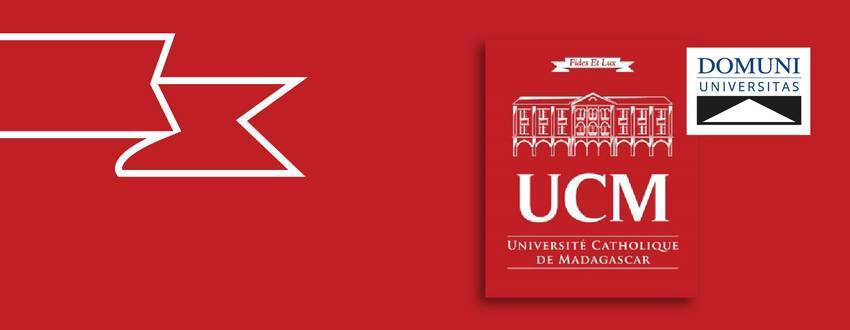News
Strengthening the Fight Against Corruption: Academic and Institutional Synergies

19 february 2025
Strengthening the Fight Against Corruption: Academic and Institutional Synergies
On this February 18, 2025, the Catholic University of Madagascar (UCM) hosted an interdisciplinary study day dedicated to corruption under the theme: "Thinking Corruption: Plural Approaches and Perspectives to Break the Chain." This initiative was led by Dr. Manuel Rivero, Dean of the Faculty of Social Sciences at Domuni Universitas, in coordination with UCM’s Research Center, directed by Dr. Sohary Razanaparany.
Longstanding partners, the Catholic University of Madagascar and Domuni Universitas shared a significant moment during this study day. Bringing together researchers, faculty members, and experts, the event provided an opportunity to discuss the multiple dimensions of corruption and explore potential strategies for fostering a more ethical society.
A Systemic Corruption with Devastating Effects
Right from the opening speeches, the prevalence of corruption in Malagasy society was highlighted. The intervention of the Director of Transparency International Madagascar was particularly well received. Considered systemic, corruption affects all sectors, from the judicial system to public administration, education, and the economy. This reality fuels a vicious cycle where poverty and corruption mutually reinforce each other, exacerbating citizen demotivation and hindering development.
First Session: Corruption and Human Development
The morning was dedicated to an in-depth analysis of the effects of corruption on human development. Dr. Rivero’s presentation placed corruption within the framework of the Church’s social teaching, emphasizing that it constitutes a major obstacle to “the development of the whole person and all people.”
Another intervention explored the links between poverty and corruption, questioning whether they coexist or interact in a cyclical manner. Based on empirical studies, speakers illustrated how the lack of socio-economic opportunities drives individuals to resort to corrupt practices for survival. It was also emphasized that rural areas are particularly vulnerable to these dynamics due to the lack of sufficient resources to implement effective monitoring and transparency mechanisms.
Second Session: Cultural and Religious Perspectives
The second session adopted an anthropological and theological approach. Speakers examined traditional Malagasy values, notably fihavanana (solidarity) and fahaiza-miaina (social wisdom), which are sometimes manipulated to justify corrupt practices.
From a religious perspective, participants reflected on ways to bridge the gap between Gospel teachings and the daily behaviors of the faithful regarding corruption. Concrete proposals were put forward, particularly in terms of ethical guidance and pastoral awareness. Among these, strengthening youth education on values of integrity and respect for common goods was highlighted as a priority.
Third Session: Legal Issues and Anti-Corruption Mechanisms
The afternoon was marked by an analysis of both national and international anti-corruption prevention and enforcement mechanisms. One presentation outlined the existing legal instruments, shedding light on enforcement challenges and the limitations of the current legal framework.
A key moment in this session was the speech by the Rector of Domuni Universitas, who presented international legal instruments for combating corruption, stressing their importance in preventing and prosecuting corruption. The strong presence of Domuni Universitas' rectorate and Faculty of Social Sciences at this event underscores the institution’s commitment to fostering a more ethical society.
Participants also discussed the urgent need to strengthen the independence of institutions responsible for fighting corruption to prevent political interference and improve the effectiveness of sanctions.
Roundtable: Acting Together Against Corruption
A highlight of the day, the roundtable brought together various experts to tackle a crucial question: How can an effective synergy be built to combat corruption? Participants emphasized the importance of a holistic approach, combining political action, citizen engagement, integrity education, and institutional strengthening.
A key proposal was the creation of a collaborative platform among the various organizations involved in the fight against corruption. Such a platform would facilitate information exchange and harmonize intervention strategies.
The Partnership Between Domuni Universitas and UCM
This event perfectly illustrates the fruitful cooperation between Domuni Universitas and the Catholic University of Madagascar (UCM), a long-standing academic partnership based on shared values of integrity, social justice, and educational excellence. Thanks to this synergy, enriching exchanges and joint research projects are regularly developed.
This study day is just one step in a broader commitment that will lead to further initiatives aimed at deepening reflections and strengthening anti-corruption efforts through education, research, and awareness-raising.
Perspectives and Future Developments
The discussions from this study day will serve as the basis for a special issue in UCM’s Journal of Integral Development. Furthermore, contributions from the debates will inform future academic and policy reflections on corruption in Madagascar. The importance of continuing these discussions through regular seminars was underscored to ensure the follow-up of the recommendations formulated during the study day.
Thus, this study day not only deepened the understanding of the corruption phenomenon but also opened new avenues for reflection and action toward building a more just and transparent society. The necessity of a collective awareness and a long-term commitment from various stakeholders was reaffirmed as an essential element in putting an end to this scourge that hinders the country’s development.
